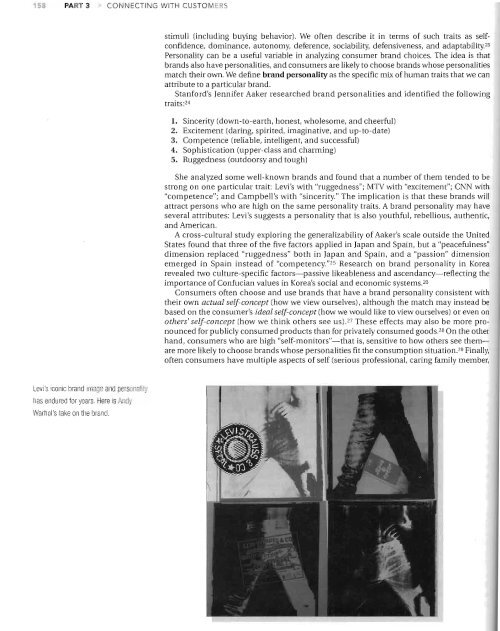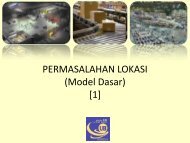- Page 1 and 2:
If you no longer require this revie
- Page 3 and 4:
Preface xxix PART 1 Understanding M
- Page 5 and 6:
PART 2 Capturing Marketing Insights
- Page 7 and 8:
xlii Maximizing Customer Lifetime V
- Page 9 and 10:
xv MARKETING INSIGHT Establishing C
- Page 11 and 12:
I " Product Life-Cycle Marketing St
- Page 13 and 14:
Chapter 13 Designing and Managing S
- Page 15 and 16:
Channel-Management Decisions 423 Se
- Page 17 and 18:
ywiii _[ 1.-'---__ Chapter 18 Manag
- Page 19 and 20:
xxv I/~-----------~'" ----, Organiz
- Page 21 and 22:
xxvii BREAKTHROUGH MARKETING Starbu
- Page 23 and 24:
,r~---------~---------~ r 1 ::: Wha
- Page 25 and 26:
: :: Revision Strategy for the Thir
- Page 27 and 28:
Chapter 12 • Product returns •
- Page 29 and 30:
( J ------!....-.---~---, Instructo
- Page 31 and 32:
..-----------~---------~-" .. The t
- Page 33 and 34:
--=-0_··----~__) __ • Thomas Te
- Page 36 and 37:
.lN3lt\J39\7'NVlt\J 9N 1.1..3>1 tlV
- Page 38 and 39:
generatesasliver'of.paid 7search re
- Page 40 and 41:
6 PART 1 UNDERSTANDING MARKE.TING M
- Page 42 and 43:
a PART 1 UNDERSTAr\iDING MARKETING
- Page 44 and 45:
10 PART 1 UNDERSTANDING MARI
- Page 46 and 47:
12 PART 1 UNDERSTANDING MARKETlr\lG
- Page 48 and 49:
14 PART 1 UNDERSTANDING MARKETING M
- Page 50 and 51:
16 PART 1 UNDERSTANDING MARKETING M
- Page 52 and 53:
18 PART 1 UNDERSTANDING MARKETING M
- Page 54 and 55:
~ 20 PART 1 UNDERSTANDING MARKETING
- Page 56 and 57:
22 PART 1 UNDERSTANDING MARKETING M
- Page 58 and 59:
csnlllJdl Connr,r.tions olllifiti I
- Page 60 and 61:
26 PART 1 UNDERS-rANDING MARKETING
- Page 62 and 63:
28 PART 1 UNDERSTANDING MARKETING M
- Page 64 and 65:
30 PART 1 UNDERSTANDING MARKETING M
- Page 67 and 68:
------------ CHA TER 2 ••• ..
- Page 69 and 70:
o VELOPING MARKETING STRATEGIES AND
- Page 71 and 72:
DEVE.LOPING MARKE.TING STRATEGIES A
- Page 73 and 74:
DEVELOrlNG MARKETING STRATEGIES AND
- Page 75 and 76:
DEVELOPING MARKETING STRATEGIES A D
- Page 77 and 78:
DEVELOPING MARKETING STRATEGIES AND
- Page 79 and 80:
DEVELOPING MARKETING STRATEGIES AND
- Page 81 and 82:
DEVELOPING MARKETING STRATEGIES AND
- Page 83 and 84:
DEVELOPING MARKETING STRATEGIES AND
- Page 85 and 86:
DEVELOPING tvlARKETINCi STRATEGIES
- Page 87 and 88:
DEVELOPING MARKETING S1RATEGIES AND
- Page 89 and 90:
DEVI::LOPING MARKETING STRATEGIES A
- Page 91 and 92:
DEVELOPING MARKETING STRATEGIES AND
- Page 93 and 94:
DEVELOPING MARKETING STRATEGIES Af\
- Page 95 and 96:
DEVELOPING MARKETING STRATEGIES AND
- Page 97 and 98:
DEVELOPING MARKETING STRATEGIES AND
- Page 99 and 100:
CH PTER 3 ... GATHERING INFORMATION
- Page 101 and 102:
GATHERING INFORMATlOf\! AND SCANNII
- Page 103 and 104:
GATHERING INFORMATIO AND SC NNING T
- Page 105 and 106:
GATHERING INFORMATION AND SCANNING
- Page 107 and 108:
GATHERING INFORMATION AND SCANNING
- Page 109 and 110:
GATHERING INFORMATION AND SCANI\JIN
- Page 111 and 112:
GATHERING INFORMATION AND SCAI\ININ
- Page 113 and 114:
GATHERING INFORMATION AND SCANi\jIN
- Page 115 and 116:
GATHERI G INFORMATIO o SCANNING THE
- Page 117 and 118:
GATHERING INFORMATION AI'lD SCANNIN
- Page 119 and 120:
GATHERING INFORMATION AND SCANNING
- Page 121:
GATHERING INFORMATION AND SCANNING
- Page 124 and 125:
90 PART 2 CAPTURING MARKETING INSIG
- Page 126 and 127:
92 PART 2 CAPTURING MARKETING INSIG
- Page 128 and 129:
94 PART 2 CAPTURING MARKETING INSIG
- Page 130 and 131:
'J6- PART 2 CAPTURING MARKETING INS
- Page 132 and 133:
98 PART 2 CAPTURING MARKETING INSIG
- Page 134 and 135:
100 PARi 2 CAPTURING MARKETING INSI
- Page 136 and 137:
1(1;e PART 2 CAPTURING MARKETING IN
- Page 138 and 139:
04 PART 2 CAP lURING rVIARI
- Page 140 and 141:
106 PART 2 CAPTURING MARKETING INSI
- Page 142 and 143: 108 PART 2 CAPTURING MARKETING iNSI
- Page 144 and 145: 110 PART 2 CAPTURING MARKETING INSI
- Page 146 and 147: 112 PART 2 CAPTURING MARKETING INSI
- Page 148 and 149: 114 PART 2 CAPTURING MARKETING INSI
- Page 150 and 151: 116 PART 2 CAPTURING MARKETING INSI
- Page 152 and 153: SCl3lt\101sn::> HllM 9Nll::>3NNOJ
- Page 154 and 155: 120 PART 3 CONNECTING WITH CUSTOMER
- Page 156 and 157: 1. Identify the majorattributes and
- Page 158 and 159: 124 PART 3 CONNECTING WITH CUSTOMER
- Page 160 and 161: 126 PART 3 CONNECTING WITH CUSTOMER
- Page 162 and 163: 128 PART 3 CONNECTING WITH CUSTOMER
- Page 164 and 165: 130 PART 3 CONNECTING WITH CUSTOMER
- Page 166 and 167: 132 PART 3 CONNECTING WITH CUSTOMER
- Page 168 and 169: 134 PART 3 CONNECTING WITH CUSTOMER
- Page 170 and 171: !l PART 3 CONNECTING WITH CUSTOMERS
- Page 172 and 173: 138 PART 3 CONNECTING WITH CUSTOMER
- Page 174 and 175: 140 PART 3 CONNECTING WITH CUSTOMER
- Page 176 and 177: 142 PART 3 CONNECTING WITH CUSTOMER
- Page 178 and 179: 144 PART 3 CONNECTING WITH CUSTOMER
- Page 180 and 181: 46 PART 3 CONNECTING WITH CUSTOMERS
- Page 182 and 183: I I I .._--------------
- Page 184 and 185: ISO PAIH :3 CONNECTING WITH CUSTOME
- Page 186 and 187: 152 PART 3 CONNECilNG WITH CUSTOMER
- Page 188 and 189: 154 PART 3 CONNECTING WITH CUSTOIv1
- Page 190 and 191: 156 PART 3 CONNECTING WITH CUSTOMER
- Page 194 and 195: 160 PART 3 CONNECTiNG WITH CUSTOMER
- Page 196 and 197: 162 PART 3 CONNECTING WITH CUSTOMER
- Page 198 and 199: 164 PART 3 CONNECTING WITH CUSTOMER
- Page 200 and 201: 166 PART 3 CONNECTING WITH CUSTOMER
- Page 202 and 203: 168 PART 3 CONNECTING WiTH CUSTOMER
- Page 204 and 205: 170 PART 3 CONNECTING WITH CUSTOMER
- Page 206 and 207: 172 PART 3 CONNECTING WITH CUSTOMER
- Page 208 and 209: 174 PART 3 CONNECTING WITH CUSTOMER
- Page 210 and 211: 176 PART 3 CONr"IECTING WITH CUSTOM
- Page 212 and 213: 178 PART 3 CONNECTING WITH CUSTOMER
- Page 214 and 215: ,dl,dl' CISCO. Welcome to You, Inc.
- Page 216 and 217: 182 PART 3 CONNECTING WITH CUSTOMER
- Page 218 and 219: 184 PART 3 CONNECTING WITH CUSTOMER
- Page 220 and 221: 186 PART 3 CONNECTING WITH CUSTOMER
- Page 222 and 223: PART 3 CONNECTING WITH CUSTOMERS vi
- Page 224 and 225: PART 3 CONNECTING WITH CUSTOMERS Re
- Page 226 and 227: 192 PART 3 CONNECTING WITH CUSTOMER
- Page 228 and 229: 194 PART 3 CONNECTING WITH CUSTOMER
- Page 230 and 231: 196 PART 3 CONNECTING WITH CUSTOMER
- Page 232 and 233: 1'1 PART 3 CONNECTING WITH CUSTOMER
- Page 234 and 235: 1---\ MARKETING INSIGHT ESTABLISHIN
- Page 236 and 237: 202 PART 3 CONNECTING WITH CUSTOMER
- Page 238 and 239: 204 PART 3 CONNECTING WITH CUSTOMER
- Page 241 and 242: CHA TER 8 ••• • •• IDEN
- Page 243 and 244:
IDENTIFYING M RI
- Page 245 and 246:
I ENTIFYING MARK T SEGMENTS AND TAR
- Page 247 and 248:
IDEr-.JTlFY NG MARKET SEGMENTS AND
- Page 249 and 250:
IDENTIFYING MARKET SEGMENTS AND TAR
- Page 251 and 252:
Media have emerged to make gender t
- Page 253 and 254:
D,,~"TIFYING MARKET SEGMENTS AND TA
- Page 255 and 256:
I. Innovators-Successful, sophistic
- Page 257 and 258:
IDENTIFYING MARKET SEGMENTS AND TAR
- Page 259 and 260:
iDENTIFYING MARKET SEGMENTS AND TAR
- Page 261 and 262:
IDENTIFYING MARKET SEGMENTS AND TAR
- Page 263 and 264:
IDENTIFYING MARKET SEGMENTS AND T R
- Page 265 and 266:
IDENTIFYING MARKET SEGMENTS AND TAR
- Page 267 and 268:
IDENTIFYING MARKET SEGMENTS AND TAR
- Page 269 and 270:
CHA TE CREATING BRAND EQUITY At the
- Page 271 and 272:
CREATING BRAND EQUITY CHAPTER 9 237
- Page 273 and 274:
BREAKTHROUGH MARKETING PROCTER & GA
- Page 275 and 276:
C CATIN . GRAN EQUITY CHAPTER 9 241
- Page 277 and 278:
CRF.ATiNG l:lRAND EOUITY CHAPTER 9
- Page 279 and 280:
CREATING BRAND EQUITY CHAPTER 9 245
- Page 281 and 282:
CR ATING BRAND EQUITY CHAPTER 9 247
- Page 283 and 284:
CR ATING BRAND EQUITY CHAPTER 9 249
- Page 285 and 286:
CR ATING BRAND EQUITY CHAPTER 9 251
- Page 287 and 288:
CREATING BRAND EQUITY CHAPTER 9 253
- Page 289 and 290:
CREATING BRAND EQUITY CHAPTER 9 255
- Page 291 and 292:
CREATING BRAND EQUITY CHAPTER 9 257
- Page 293 and 294:
CREATING BRAND EQUITY CHAPTER 9 Z59
- Page 295 and 296:
CREATll'·JG BRAND EQUITY CHAPTER 9
- Page 297 and 298:
CREATING BRAND EQUITY CHAPTER 9 263
- Page 299:
CREATIN BRAND OUITY CHAPTER 9 265
- Page 302 and 303:
268 PART 4 BUiLDING STRONG BRANDS T
- Page 304 and 305:
270 PART 4 aUiLDING STRONG BRANDS B
- Page 306 and 307:
272 PART 4 BUILDING STRONG BRANDS ,
- Page 308 and 309:
274 PART 4 BUILDING STRONG BRANDS _
- Page 310 and 311:
276 PART 4 BUILDING STR
- Page 312 and 313:
278 PART 4 BUILDING STRONG BRANDS t
- Page 314 and 315:
280 PART 4 BUILDiNG STRONG RRANDS t
- Page 316 and 317:
282 PART 4 BUILDING STRONG BRANDS P
- Page 318 and 319:
284 PART 4 BUILDING STRONG BRANDS -
- Page 320 and 321:
286 PART 4 BUILDING STRONG BRANDS i
- Page 322 and 323:
288 PART 4 BUILDING STRONG BRANDS S
- Page 324 and 325:
290 PART 4 BUILDING STRONG BRANDS (
- Page 326 and 327:
-., I!ROGIIEJJIVt t!f PROGRESSIVE 1
- Page 328 and 329:
294 PART 4 BUILDING STRONG BRANDS a
- Page 330 and 331:
296 PART 4 BUILDING STRONG BRANDS I
- Page 332 and 333:
298 PART 4 BUILDING STRONG BRANDS F
- Page 334 and 335:
~ ----- 300 PART 4 BUILDING STRONG
- Page 336 and 337:
30Z PART 4 oUILLJIi'JLJ S I RUNLJ I
- Page 338 and 339:
304 PART 4 BUILDING STRONG BRANDS k
- Page 340 and 341:
306 PART 4 BUILDING STRONG BRANDS I
- Page 342 and 343:
308 PART 4 BUILDING STRONG BRANDS ~
- Page 344 and 345:
310 PART 4 BUILDING STRONG BRAf\'')
- Page 346 and 347:
312 PART 4 BUILDING STRONG BRANDS 2
- Page 348 and 349:
314 PART 4 BUILDING STRONG BRANDS :
- Page 350 and 351:
S9NI~3::J::IO 13>ltl\iV'J 3Hl 9Nld\
- Page 352 and 353:
318 PART 5 SHAPING THE MARKET OFFER
- Page 354 and 355:
320 PART 5 SHAPING THE MARKET OFFER
- Page 356 and 357:
322 PART 5 SHAPING THE MARI(ET OFFE
- Page 358 and 359:
324 PART 5 SHAPII\IG THE MARKET OFF
- Page 360 and 361:
326 PART 5 SHAPING THE MARKET OFFER
- Page 362 and 363:
328 PART 5 SHAPING THE MARKET OFFER
- Page 364 and 365:
330 PART 5 SHAPING THE MARKET OFFER
- Page 366 and 367:
332 PART 5 SHAPING THE MARKET OFFER
- Page 368 and 369:
334 PART 5 SHAPING THE MARKET OFFER
- Page 370 and 371:
336 PART 5 SHAPING THE MARKET OFFER
- Page 372 and 373:
338 PART 5 SHAPING THE MARKET OFFER
- Page 374 and 375:
340 PART 5 SHAPING THE MARKET OFFER
- Page 376 and 377:
342 PART 5 SHAPING THE MARI
- Page 379 and 380:
CHAPTER 13 ••• ••• DESI
- Page 381 and 382:
,)::SIGNING AND MANAGING SERVICES C
- Page 383 and 384:
DESIGNING AND MANAGING SERVICES CHA
- Page 385 and 386:
DESIGNING AND MANAGiNG SERVICES CHA
- Page 387 and 388:
DESIGNING AND MANAGING S RVICES CHA
- Page 389 and 390:
1. Redesign processes and redefine
- Page 391 and 392:
DESIGNING AND MANAGING SERVICES CHA
- Page 393 and 394:
DESIGNING AND MANAGING SERVICES CHA
- Page 395 and 396:
TABLE 13.2 SERVOUAI I\tlrlllllle8 R
- Page 397 and 398:
DESIGNING AND MANAGING SERVI ES CHA
- Page 399 and 400:
DESIGNING AND MANAGING SERVICES CHA
- Page 401 and 402:
DESIG ING AND MANAGING SERVICE CHAP
- Page 403 and 404:
DESIGNING AND MA AGING SERVICES CHA
- Page 405 and 406:
DESIGNING AND MANAGING SERVICES CHA
- Page 407:
DESIGNING A D MANAGING SERVICES CHA
- Page 410 and 411:
6 PART 5 o,H/.l,PII\JC,i 1 HE IVlAR
- Page 412 and 413:
378 PART 5 SHAPING THE MARKET OFFER
- Page 414 and 415:
380 PART 5 SHAPING THE MARKET OFfER
- Page 416 and 417:
382 PART 5 SHAPING THE MARKET OFFER
- Page 418 and 419:
384 PART 5 SHAPING THE MARI
- Page 420 and 421:
386 PART 5 SHAPING THE MARKET OFFER
- Page 422 and 423:
388 PART 5 SHAPING THE MARKET OF
- Page 424 and 425:
390 PART 5 SHAPING THE MARKET OFFER
- Page 426 and 427:
392 PART 5 HAPING THE MARKET OFFERI
- Page 428 and 429:
394 PART 5 SHAPING THE MARKET OFFER
- Page 430 and 431:
396 PART 5 SHAPING THE MARI,ET OFI=
- Page 432 and 433:
398 PART 5 SHAPING THE MARKET OFFER
- Page 434 and 435:
400 PART 5 SHAPING THE MARI
- Page 436 and 437:
402 PART 5 SHAPING THE MARKET OFFER
- Page 438 and 439:
404 PART 5 SH.l\.PING THE MARKET OF
- Page 440 and 441:
406 PART 5 SHAPlf\lG THE MARKET OFF
- Page 442 and 443:
3nTVA 9Nltl3AIl30 lHVd
- Page 444 and 445:
410 PART 6 DELIVERING VALUE To lear
- Page 446 and 447:
412 PART 6 DELIVERING VALUE In shor
- Page 448 and 449:
414 PART 6 DELIVERING VALUE willing
- Page 450 and 451:
416 PART 6 DELIVERING VALUE as sale
- Page 452 and 453:
418 PART 6 DELIVERING VALUE 2. Wait
- Page 454 and 455:
420 PART 6 DELIVERING VALUE wMARKET
- Page 456 and 457:
422 PART 6 DELIVERING VALUE IFIG. 1
- Page 458 and 459:
424 PART 6 DELIVERING VALUE Produce
- Page 460 and 461:
426 PART 6 DELIVERING VALUE many pe
- Page 462 and 463:
428 PART 6 DELIVERING VALUE Althoug
- Page 464 and 465:
430 PART 6 DELIVERiNG VALUE "C '" o
- Page 466 and 467:
432 PART 6 DELIVERING VALUE AS DICK
- Page 468 and 469:
434 PART 6 DELIVERING VALUE Califor
- Page 470 and 471:
436 PART 6 DELIVERING VALUE SUE'S C
- Page 472 and 473:
438 PART 6 DELIVERING VALUE • Cou
- Page 475 and 476:
441 ... HAPT 6 ••• MANAGING R
- Page 477 and 478:
If-I .._ MANAGING RETAILING, WHOLES
- Page 479 and 480:
MAr'-IAGI G RETAILING, WHOLESALING,
- Page 481 and 482:
MANAGING RETAILING, WHOLESALING, AN
- Page 483 and 484:
MANAGING RETAILING, WHOLESALING, AN
- Page 485 and 486:
MANAGING RETAILING, WHOI.ESALlNG, A
- Page 487 and 488:
MANAGI G RETAILING, WHOLESALING, AN
- Page 489 and 490:
MANAGING RETAILlf\IG, WHOLESALING,
- Page 491 and 492:
MANAGING RETAILING, WHOLESALING, AN
- Page 493 and 494:
MANAGING RETAILING, WHOLESALING, AN
- Page 495 and 496:
MANAGING RETAILi G, WHOLESALING, AN
- Page 497 and 498:
MANAGING RETAILING, WHOLESALING. AN
- Page 499 and 500:
MANAGI G RETAILING. WrIOLESALlNG, .
- Page 501 and 502:
MANAGING RETAILING, WHOLESALING, AN
- Page 503 and 504:
CHAPT 17 ••• ••• DESIGN
- Page 505 and 506:
DESIGNING AND MANAGING INTEGRAT D M
- Page 507 and 508:
4'~ PAl< I I CUIViIVIUNILAIINl> VAI
- Page 509 and 510:
474 PART 7 COMMUNICATING VALUE Mark
- Page 511 and 512:
416 PART 7 COMMU~IICATING VALUE man
- Page 513 and 514:
478 PART 7 COMMUNICATING VALUE opti
- Page 515 and 516:
480 PART 7 COMMUNICATING VALUE ~ MA
- Page 517 and 518:
482 PART 7 COMMUNICATING VALUE Phar
- Page 519 and 520:
484 PART 7 COMMUNICATING VALUE popu
- Page 521 and 522:
486 PART 7 COMMUNICATING VAI.I.JE :
- Page 523 and 524:
488 PART 7 COMMUNICATING VALUE TABL
- Page 525 and 526:
490 PART 7 COIVIIVIUNICATING VALUE
- Page 527 and 528:
492 PART 7 COMMUNICATING VALUE it i
- Page 529 and 530:
494 PART 7 COMMUNICATING VALUE ~ MA
- Page 532 and 533:
CAPT 1 ••• ••• MANAGING
- Page 534 and 535:
MANAGING MASS COMMUNICATIONS CHAPTE
- Page 536 and 537:
MANAGING MASS COMMUNICATIONS CHAPTE
- Page 538 and 539:
MANAGiNG MASS COMMUNICATIONS CHAPTE
- Page 540 and 541:
MANAGING MAS COMMUNICATIONS CHAPTER
- Page 542 and 543:
MANAGING MASS COMMUNICATIONS CHAPTE
- Page 544 and 545:
MANAGING MASS COMMUNICATIONS CHAPTE
- Page 546 and 547:
MANAGING MASS COMMUNICATIONS CHAPTE
- Page 548 and 549:
MANA Jlt\lG MASS COMMUNICATIONS CHA
- Page 550 and 551:
MANAGING MASS COMMUNICATIONS CHAPTE
- Page 552 and 553:
MANAGIN MASS COMMUNICATIONS CHAPTER
- Page 554 and 555:
MANAGING MASS COMMUNICATIONS CHAPTE
- Page 556 and 557:
MANAGING MASS COMMUNICATI(iNS CHAPT
- Page 558 and 559:
MANAGING MASS COMMUNICATIONS CHAPTE
- Page 560 and 561:
MANAGING MASS COMMUNICATIONS CHAPTE
- Page 562 and 563:
MANAGING MASS COMMUNICATIONS CHAPTE
- Page 564:
MA AGING MIl.S_ C MMUNICATlONS CHAP
- Page 567 and 568:
532 PART 7 COMMUNICATING VALUE ~~ ;
- Page 569 and 570:
534 PART 7 COMMUNICATING VALUE in-s
- Page 571 and 572:
536 PART 7 COMMUNICATING VALUE A le
- Page 573 and 574:
538 PART 7 COMMUNICATING VALUE Othe
- Page 575 and 576:
540 PART 7 COMMUNICATING VALUE PEPS
- Page 577 and 578:
542 PART 7 COMMUNICATING VALUE ~ MA
- Page 579 and 580:
544 PART 7 COMMUNICATING VALUE BMW'
- Page 581 and 582:
546 PART 7 COMMUNICATING VALUE TAKK
- Page 583 and 584:
548 PART 7 COMMUNICATING VALUE - st
- Page 585 and 586:
550 PA~T 7 COMMUNICATING VALUE Forc
- Page 587 and 588:
552 PART 7 COMMUNICATING VALUE prod
- Page 589 and 590:
554 PART 7 COMMUNICATING VALUE Esta
- Page 591 and 592:
556 PART 7 COMMUNICATING VALUE Mana
- Page 593 and 594:
558 PART 7 COMMUNICATING VALUE Comp
- Page 595 and 596:
560 PART 7 COMMUNICATING VALUE from
- Page 597 and 598:
562 PART 7 COMMUNICATING VALUE OVER
- Page 599 and 600:
l~"d
- Page 601 and 602:
:l00 PART 8 CREATING SUCCESSFUL LON
- Page 603 and 604:
568 PART 8 CREATING SUCCESSFUL LONG
- Page 605 and 606:
510 PART 8 CREATING SUCCESSFUL LONG
- Page 607 and 608:
572 PART 8 CREATING SUCCESSFUL LONG
- Page 609 and 610:
574 PART 8 CREATING SUCCESSFUL LONG
- Page 611 and 612:
576 PART 8 CREATING SUCCESSFUL LONG
- Page 613 and 614:
578 PART 8 CREATING SUCCESSFUL LONG
- Page 615 and 616:
580 PARI S CREATING SUCCESSFUL LONG
- Page 617 and 618:
58l PART 8 CREATING SUCCESSFUL LONG
- Page 619 and 620:
584 PART 8 CREATING SUCCESSFUL LONG
- Page 621 and 622:
586 PART 8 CREATING SUCCESSFUL LONG
- Page 623 and 624:
588 PART 8 CREATING SUCCESSFUL LONG
- Page 625 and 626:
590 PART 8 CREATING SUCCESSFUL LONG
- Page 627 and 628:
592 PART 8 CREATING SUCCESSFUL LONG
- Page 629 and 630:
594 PART 8 CREATING SUCCESSFUL LONG
- Page 632 and 633:
CHAPTE 1 ••• ••• TAPPIN
- Page 634 and 635:
TAPPING INTO GLOBAL MARKETS CHAPTER
- Page 636 and 637:
TAPPING Ir'>JTO GLOBAL MARKETS CHAP
- Page 638 and 639:
TAPPING INTO GLOBAL MARKETS CHAPTER
- Page 640 and 641:
TAPPiNG iNTO GLOBAL MARKETS CHAPTER
- Page 642 and 643:
TAPPING INTO GLOBAL MARKETS CHAPTER
- Page 644 and 645:
lAPPING INTO GLOBAL MARKETS CHAPTER
- Page 646 and 647:
TAPPING INTO GLOBAL MARI
- Page 648 and 649:
TAPPING INTO GLOBAL MARKETS CHAPTER
- Page 650 and 651:
TAPPING INTO GLOBAL MARKETS CHAPTER
- Page 652 and 653:
TAPPING INTO GLOBAL MARI
- Page 654 and 655:
TAPPING INTO GLOBAL MARKETS CHAPTER
- Page 656 and 657:
TAPPING INTO GLOBAL MARKET CHAPTER
- Page 658:
TAPPING INTO GLOBAL Ml\RKETS CHAPTE
- Page 661 and 662:
626 PART 8 CREATING SUCCESSFUL LONG
- Page 663 and 664:
628 PART 8 CREATING SUCCESSFUL LONG
- Page 665 and 666:
o.>v 1.I·U1:. t) \.....t\Cf-\III\j
- Page 667 and 668:
632 PART 8 CREATING SUCCESSFUL LONG
- Page 669 and 670:
634 PART 8 CREATING SUCCESSFUL LONG
- Page 671 and 672:
636 PART 8 CREATING SUCCESSFUL LONG
- Page 673 and 674:
638 PART 8 CREATING SUCCESSFUL LONG
- Page 675 and 676:
640 PART 8 CREATING SUCCESSFUL LONG
- Page 677 and 678:
642 PART 8 CREATING SUCCESSFUL LONG
- Page 679 and 680:
644 PART 8 CREATING SUCCESSFUL LONG
- Page 681 and 682:
646 PART 8 CREATING SUCCESSFUL LONG
- Page 683 and 684:
O~tI "'AI
- Page 685 and 686:
650 PART 8 CREATING SUCCESSFUL LONG
- Page 687 and 688:
652 PART 8 CREATING SUCCESSFUL LONG
- Page 689 and 690:
654 PART 8 CREATING SUCCESSFUL LONG
- Page 691 and 692:
656 PART 8 CREATiNG SUCCESSFUL LONG
- Page 693 and 694:
658 PARi 8 CREATING SUCCESSFUL LONG
- Page 695 and 696:
660 PART 8 CREATING SUCCESSFUI_ LON
- Page 697 and 698:
662 PART 8 CREATING SUCCESSFUL LONG
- Page 699 and 700:
A2 APPENDIX SONIC MARKETING PLAN AN
- Page 701 and 702:
A4 APPENDIX SONIC MARKETING PLAN AN
- Page 703 and 704:
A6 APP!:NDIX SONIC MARKETING PLAN A
- Page 705 and 706:
~ A ...... I:NDIJI. ::>UI'lI\.. NlA
- Page 707 and 708:
A10 APPENDIX SONIC MARKETING PLAN A
- Page 709 and 710:
A12 APPENDIX SONIC MARI
- Page 711 and 712:
A14 APPENDIX SONIC MARKETING PLAN A
- Page 713 and 714:
G2 GLOSSARY brick-and-c1ick existin
- Page 715 and 716:
G4 GLOSSARY advantages in its costs
- Page 717 and 718:
G6 GLOSSARY opinion leader the pers
- Page 719:
G8 GLOSSARY T tactical marketing pl

















